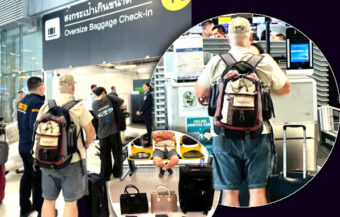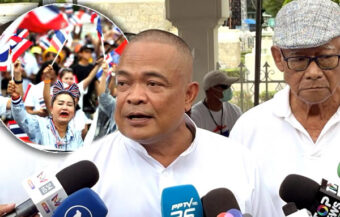The Head of Australia’s Border Force, Michael Outram, this week admitted that Australian officials indirectly caused the arrest of Hakeem Al Araibi in Thailand on November 27th last and failed to alert the Bahraini footballer Hakeem Al Araibi that his name had been mistakenly placed on an Interpol red flag list by Australian officials working under the global arrest system. In front of an Australian Senate panel, he did not apologize to the Bahraini footballer and refugee. He attributed the problem to an ‘error’ on which he refused to speculate. The move could see the way open to a civil law suit in Australia taken by the Bahraini refugee who spent over 2 months imprisoned in Thailand after he was detained at Bangkok’s Suvarnabhumi Airport on his arrival in Thailand for a short holiday. It comes as a senior Thai officials revealed that Bahrain had produced evidence to authorities in Bangkok of Al Araibi’s criminal offence in 2012 as well as his subsequent conviction for taking part in the attack on a Bahraini police station that year. If Bahrain had not backed down on February 11th allowing Al Araibi to go free, he could well have been extradited to Bahrain after adjudication by a Thai court as he was a convicted criminal well before he was granted refugee asylum status in Australia.
The story of Hakeem Al Araibi took another twist this week when a senior Australian official admitted that a blunder in Australia led the footballer to fly into a Thai prison nightmare last November sparking the controversy in the first place. The news vindicates the Thai government in the matter. However, there was further news this week that Bahraini officials had presented evidence of the footballer’s criminal activity in the 2012 attack on a Bahrani police station for which he was sentenced to 10 years in prison. The footballer evaded the sentence by traveling from Qatar to Australia in 2012 via Iran and Thailand. Thai officials have also revealed this week that the footballers status as a refugee was ‘irrelevant’ to the matter before the Thai courts as Hakeem’s refugee status was granted while he was already a convicted criminal. The happy ending of the affair last Monday also raises questions about the rule of the law, the role of the media and the application of the international refugee asylum process itself.

The dramatic release of the Bahraini international footballer Hakeem Al Araibi last week was due to a change of heart by the Bahrain’s government or royal family on the matter. Thai diplomatic sources have highlighted the role of Thailand’s Foreign Minister Don Pramudwinai whose weekend visit to the Arabian kingdom preceding the announcement that Thai authorities were able to drop court proceedings against the footballer player whose imprisonment in Thailand and threatened deportation to Bahrain to serve a 10 year prison sentence sparked outrage in Australia and throughout the world among his supporters.
Bahraini man could have been deported to Bahrain if Thai court took the view that his refugee status was irrelevant as he was a prior convicted criminal
Now this week in Bangkok, it has come to light that the Bahraini footballer could have been facing the firm and even likely prospect of deportation to Bahrain if the legal proceedings had been let run their course. In an intriguing interview with Thailand’s leading English newspaper The Bangkok Post the Director General of the International Affairs Department of the Thai Attorney General’s Office made some interesting revelations.
Bahrain supplied Thailand with evidence of guilt
The Director General revealed that Thai authorities and legal experts viewed the refugee status of the footballer as irrelevant to the case before them as the crimes that the footballer had been both charged, tried and convicted of in Bahrain had taken place well before he was granted refugee status by the Australian authorities. Significantly, he also revealed that Bahraini authorities had not only supplied evidence of the footballers conviction but also evidence that he had, in fact, been complicit in the crime in Bahrain in the first place. The Bahraini footballer was sentenced to 10 years for an assault on a police station in Bahrain in 2012. He fled his country from Qatar on the day that his conviction was announced in Bahrain.
Blunder by Australia resulted in Thai authorities being provided with a prima facie case for the extradition of Al Araibi by Bahraini authorities
Chatchom Akapin told the The Bangkok Post that Thai authorities decided to pursue extradition moves against the footballer after he was arrested flowing a red alert Interpol notice mistakenly placed by Australian authorities before he left Australia and after the Thai officials subsequently received the required evidence and supporting information from Bahrain. ‘We considered this fell into the criteria where we could assist in line with legal principles so we filed the case with the court,’ the Director General said. On the question of the footballers refugee status, the Interpol notice should not have been placed by Australian officials in the first place but was removed days after the footballer was arrested in Bangkok’s Suvarnabhumi Airport at the end of November 2018. The Australian government then requested that Thai authorities release the footballer as he was a confirmed refugee in Australia.
However, this did not impress authorities in Bangkok. ‘We considered that this point was irrelevant as the wrongdoing had been committed before he was granted the refugee status in Australia,’ Mr Akapin was reported as saying in an interview this week.
Bahrain’s extradition request withdrawal came as a huge relief to Thai legal officials involved
The decisive move that led to the footballers release came after the successful visit by Thailand’s Minister of Foreign Affairs Don Pramudwinai the weekend before last. The Thai Attorney General’s Office and the Department of International Affairs was informed formally that Monday, February 11th, that Bahrain was no longer interested in pursuing the extradition proceedings against its own national and former international footballer.
Officials in the Thai legal department were hugely relieved. The growing international outrage, particularly when the footballer appeared in court in Thailand on Monday February 4th shackled, had captured the imagination of many people online throughout the world. However, it is safe to say that the facts of the story were skewed by sympathy for the young footballer’s plight and his forced separation from his wife and teenage sweetheart with whom he had come to Thailand on a delayed honeymoon.
Thai official was ‘worried’ over Al Araibi affair
The Director General openly admitted that Thai authorities were extremely worried about the situation that had developed over the arrest of the footballer. ‘Legal officers are always working under pressure,’ he said, ‘but in this case, if you ask whether we were worried, I would say yes.’
He revealed that Thailand has extradition treaties with over 10 countries in Asia and in Europe. He said that the country received about 10 requests for extradition per year normally related to fraud, information technology offences, drugs, murder and even terrorism. Thailand also seeks extradition of Thai nationals from other countries but at much lower level. Mr Akapin highlighted the bureaucracy involved in such requests including the translation of all official documents into Thai and from Thai depending on the circumstances, for the Thai courts. Thai authorities, for instance, sought the extradite suspects in 2012 after the Bangkok bombings.
Thailand is obviously very concerned to maintain good relationships and full cooperation between all of its international partners.
Bahraini authorities halted the media circus where public opinion was on Hakeem Al Araibi’s side
The Thai Foreign Minister, Don Pramudwinai, last week praised the healthy relationship between Thailand and Bahrain when the news of the footballers release was announced on Monday the 11th February. This came a full week after Al Araibi’s infamous appearance in court. He explained that Bahraini authorities had become concerned at the criticism leveled at Thailand at the footballer’s continued detention and in particular his appearance before the Thai courts on the 4th February last. The sight of the barefoot, shackled young footballer being briskly walked past the international media is what has defined this story the conscious on the world public. ‘Please don’t send me back to Bahrain, they will torture me,’ his words at that moment the rallying call for all who were subsequently delighted to see his release and unification with his wife last Monday the 11th February 2019. This was the happy ending the world asked for and got.
Thai Foreign Minister trip to Manama was the breakthrough and prevented an even bigger tragedy and controversy developing for all concerned
That happy ending was made possible by the flying visit of Thailand Foreign Minister to Bahrain the weekend before during which he was granted an audience with Prince Salman bin Hamad bin Isa Al Khalifa, Bahrain’s crown Prince. It was also reported that during that meeting, the Crown Prince received a phone call from Thailand’s Prime Minister Prayut Chan ocha. It has been made clear that the meeting and the phone call specifically addressed the extradition proceedings involving the Bahraini footballer as well as ‘Bahraini Thai relations’ and ways in which both countries could cooperate. Significantly, while the meeting was being held in Manama, Bahrain’s capital, there was no Bahraini media coverage nor afterwards on the matter at all. The media in Bahrain is very much state controlled especially since the 2011 to 2014 Shia Muslim uprising shook Bahraini authorities who had previously dabbled in reforms.
Questions over the Al Araibi saga remain
That Monday, the 11th February, the proceedings were dropped and the Bahraini footballer flew home to a hero’s welcome in Australia. Questions remain in relation to this story. The failure by Australian authorities which propelled the footballer into the nightmare, in the first place, by placing him on the Interpol red list. This occurred on the day that the Thai consulate in Melbourne granted a visa to the footballer to visit Thailand and some foreign media have asked questions about this.
However, most significant of all, is the fact that the Bahraini authorities are reported to have provided evidence that the footballer was complicit in the crime in 2012 for which his brother and another are still serving time in prison in Bahrain having been convicted along with Al Araibi and sentenced to 10 years. His supporters say he was playing in a televised football match just before the attack on a Bahrain police station by a mob and that he is innocent of the crime for which he was convicted. They point out that the football match only came a conclusion 20 minutes before the attack took place. This all took place before Hakeem Al Araibi arrived in Australia via Iran and Thailand to be later granted refugee status there.
Thai government vindicated as senior Australian official admits blunder by Australian authorities in Al Araibi affair blaming an ‘error’
It is now reported that Michael Outram, the boss of Australia’s Border Force, has admitted to an Australian Senate inquiry that Hakeem Al Araibi should not have been allowed board the flight on November 27th when he flew to his arrest by Thai police at Bangkok’s Suvarnabhumi Airport and a subsequent nightmare which saw him jailed under Thailand’s harsh prison regime for over two months.
‘To offer an apology for him would say that the outcome…it was entirely due to that error,’ he said. ‘I can’t say that without speculating,’ he said. The question now arises if Hakeem Al Araibi might sue Australian authorities for his ordeal. The footballer has won hands down in the court of public opinion so far but now could find himself in a strong position in an Australian civil court if he pursues a civil case.
Refugee asylum policy has long term implications for the rule of law in every country worldwide
The whole story of Hakeem Al Araibi and his ordeal in Thailand raises serious questions about the application of the rule of law worldwide and in particular the possible, subverting role of the international asylum process when it comes to the rule of law in national jurisdictions. Question that may take a long time to answer as long as the media continues fixated on emotional judgments. There is, however, no denying that the footballer may have suffered repression and torture in Bahrain. For many independent observers, this how the system should work, holding governments who abuse human rights to account and giving the benefit of doubt to the individual, wherever possible. Even in developed countries, where administrative systems break down, as the Australian one did in this case, leading to Hakeem Al Araibi’s nightmare ordeal held in a Bangkok prison.


















